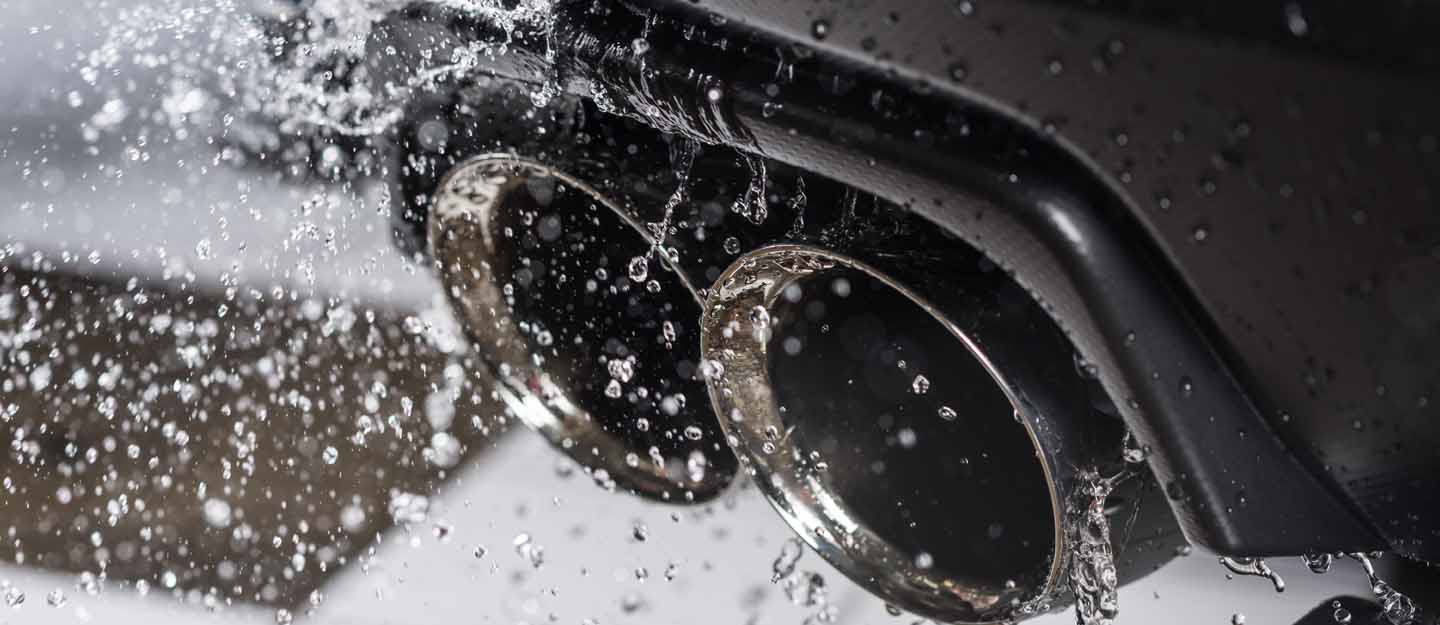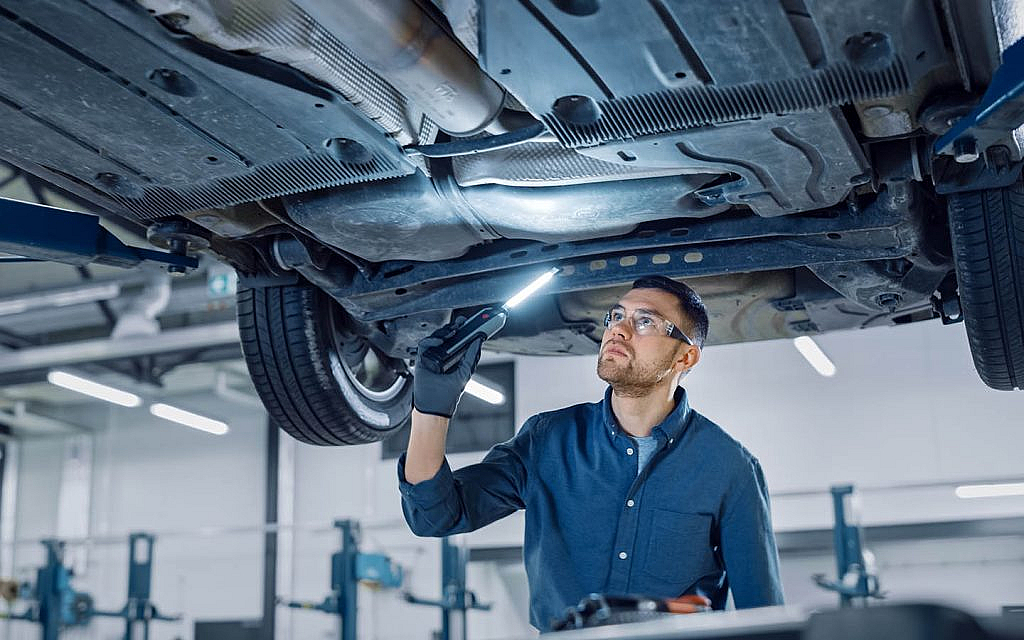Unravelling the Reasons and Fixes for Water Leaks in The Car’s Muffler

- Causes and Fixes
- FAQs
Water leaking from the muffler is a normal occurrence during the combustion process. During the combustion process, water vapour is produced as a natural byproduct. When the hot exhaust gases come into contact with the cooler surfaces of the exhaust system, the water vapour condenses into liquid water. This allows the car to warm up fully before driving and taking longer drives can help evaporate excess moisture. However, if water leakage is accompanied by smoke, it is a matter of concern. Let’s go through the symptoms of water leaking from the muffler.
Causes and Fixes of Water Leaking from the Muffler

The explanation provided above clarifies that the occurrence of water leaking from a car’s muffler is a natural outcome of the combustion process. Consequently, there is typically no cause for concern unless accompanied by the presence of white smoke, along with a burning or sweet aroma. In such instances, immediate attention to the vehicle is crucial. Now, let’s delve into the top five reasons for water leaking from the muffler.
Engine Combustion and Water Condensation
The primary cause of water dripping from the muffler is engine combustion and subsequent water condensation. During the internal combustion process, water vapour, carbon dioxide, carbon monoxide and nitrogen are formed. As the gases exit the chamber, a mixture of water vapour and carbon dioxide is created.
Once the engine cools down, water condensation occurs, leading to the observation of water droplets flowing out of the exhaust pipe—a normal occurrence that should not raise concerns. Here are the different types of car exhaust system pipes.
Condensation From Heat
Similarly, mufflers leaking water is ordinary when it results from heat condensation in the engine, especially in colder climates. Starting a car generates excess heat, combining with the cold external air to produce water vapour in the exhaust. While water droplets may emanate from the exhaust pipe initially, they typically clear up after a few minutes. Allowing the vehicle’s engine to run for a while before driving helps minimise the issue.
Catalytic Converter
Water leaking from the muffler can also be a typical aftereffect of the catalytic converter’s functioning. Catalytic converters transform toxic emissions into non-harmful components and harmless substances may exist in either liquid or gaseous forms. Small amounts of water vapour resulting from this process should not raise significant concerns.
Smoke and Water Emissions

While the previously mentioned causes are not indicative of a malfunctioning vehicle, water leaking from the exhaust muffler becomes a serious concern if it is symptomatic of a blown head gasket. Key signs include white smoke from the exhaust pipe, air bubbles in the coolant reservoir and irregular overheating. Immediate attention is necessary to prevent further damage, such as engine breakdown.
Damaged Piston Rings
If faulty piston rings are the cause, water seeping out of the tailpipe can escalate. A damaged piston may result in white smoke and water escaping from the exhaust. The situation becomes more critical if unusual odours, such as a burning smell or a sweet aroma, permeate the cabin. In such cases, it is advisable to have the car towed to an auto repair shop for a comprehensive checkup.
Symptoms of Water Leaking from Muffler
Understanding the key factors behind muffler water leaks allows for a clearer distinction between normal occurrences and potential issues. If you observe conspicuous water leakage accompanied by the following significant signs, seeking advice from a mechanic becomes essential.
Noises
Detecting an excessively noisy engine exhaust after starting the car is a symptom of a malfunctioning exhaust system. It can force gases out through cracks rather than the tailpipe, leading to unusual noises such as hissing sounds. Therefore, if you experience such noises, it is crucial to address the issue promptly. Besides, here are the common causes and solutions for car muffler rattling.
Gas Smell
Gasket failure or a gasket leak near engine wires or plastic components under the hood can generate a burning smell due to the ignition of gases. The gas fumes resulting from a muffler leak pose a significant threat if they enter the passenger cabin. It is imperative to take your car to an automotive repair shop as soon as you detect a burning smell. Delaying until smoke is visible puts your safety at risk.
Loss of Acceleration and Power

One noticeable consequence of exhaust system errors is a loss of acceleration and power. Pressing the accelerator requires more force than usual to achieve the desired momentum. This situation worsens if a muffler leak is left unaddressed, emphasising the need for timely attention. Here are some other reasons car acceleration feels sluggish.
Bad Fuel Economy
Symptoms of car exhaust leaks include bar fuel economy. Due to the loss of acceleration and power, the engine demands more fuel to operate efficiently. Specifically, the disruption of the air-to-fuel ratio balance in an exhaust leak leads to poor fuel efficiency. Monitoring and addressing these issues promptly can prevent further complications and ensure the continued safe and efficient operation of your vehicle.
FAQs
Is Water Leaking from the Muffler Bad?
Muffler leaking water is a natural process of heat condensation and engine combustion. Typically, catalytic converters also cause this. It becomes a cause for concern only if the water coming out of the tailpipe is accompanied by unusual smells like burning or gas.
Do Mufflers Come with Weep Holes?
Yes, weep holes are small openings in a car’s muffler that allow water to drain out. They prevent water accumulation, preventing internal rusting. Although all mufflers have weep holes, their specific locations vary depending on the make and model of the car.
Can a Muffler Malfunction Without Leaking?
Yes, a muffler can deteriorate without any visible leaks. This typically occurs when the baffles inside the muffler rust and deteriorate, leading to increased exhaust noise. If you notice an unusually loud exhaust noise, it’s advisable to consult a mechanic for a thorough inspection.
Is Muffler Replacement a Complex Task?
If you’re comfortable with hands-on work, replacing a muffler is a relatively straightforward task. The tools required include a wrench, a jack for lifting the vehicle, various-sized ratchets, lubricant and a hacksaw.
Those were all the causes and fixes for water leaking from the muffler. The problem can take place in both new and used cars in the UAE.
Besides, here are the causes and fixes for cracked exhaust pipes in cars.
Stay tuned to dubizzle’s top auto blog for more on various car part problems and fixes.